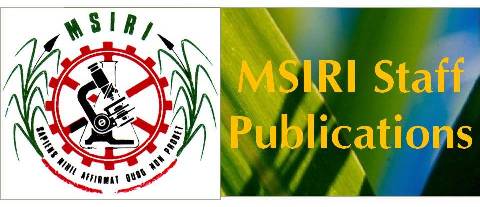Advancing frontiers of the Mauritian sugar cane industry: the case of Jigawa State in Nigeria
| MSI02P3730 | |
| Autrey, L. J. C. Ng Kee Kwong, K. F. Ah Koon, D. | |
| Mauritius Sugar Industry Research Institute | |
| Advancing frontiers of the Mauritian sugar cane industry: the case of Jigawa State in Nigeria | |
| 10ème congrès International: Innovations Technologiques et savoir-faire, MSIRI, 27 septembre-1er octobre 2002 | |
| periodical article | |
| 2001/02 | |
| Revue agric. sucr. Ile Maurice | |
| 80 (3) / 81(1-3): 30-34 | |
| Published 2003 | |
| En | |
| En Fr | |
| There are only two sugar mills in Nigeria and they produce less than one percent of the 1 000 000 tonnes sugar consumed annually in that country. From that perspective, to attain self-sufficiency in sugar, sugarcane has become a mandate crop to be grown by Jigawa State, one of the 36 states in Nigeria having an abundance of cheap manpower which is now mostly engaged in subsistence farming. Jigawa State, with its flat to gently sloping topography, does not lack water thanks to two dams, each capable of storing more than two billion m3 of water. This abundant water supply, coupled with a favourable climatic environment, e.g a mean solar radiation of 24 MJ day-1, are conducive to rapid cane growth and sugarcane yields exceeding 100 tonnes ha-1 and sugar in excess of 11 tonnes ha-1 are certain to be regular features in Jagawa State if the sugarcane is properly managed and free from pests and diseases. Developing and sustaining the productivity of a sugar industry in Jigawa State however requires an expertise and capability which that State currently does not have but which Mauritius is able to provide. For instance, at present, though 10 000 ha have been cultivated with sugarcane, there is still no sugar mill. A research centre endowed with the necessary laboratories is also lacking and research in agronomy, crop protection and crop improvement needs to be undertaken in the immediate/medium term. Implementation of research projects, moreover calls for the university graduates which will be recruited for irrigation, soil analysis, variety introduction, development and selection, pathology, entomology and so on to receive at least one-month specialized training in their respective fields. Linkages within the framework of a South-South collaboration between Jigawa State and Mauritius are discussed in relation to the new situation in Mauritius arising from the application of the Sugar Sector Strategic Plan (2000 - 2005). [FRENCH: Le Nigéria possède seulement deux usines sucrières, produisant moins d'un pourcent des 1 000 000 tonnes de sucre consommé annuellement dans ce pays. Ainsi, pour aider le pays à atteindre l'autosuffisance en sucre, l'état de Jigawa, un des 36 états du Nigéria, a été mandaté pour produire la canne à sucre. L'état de Jigawa a une main-d'oeuvre abondante et bon marché pratiquant principalement une agriculture de subsistance. De plus, cet état bénéficie d'une topographie relativement plate et ne manque pas d'eau, grâce à l'apport de deux barrages ayant chacun une capacité de stockage de plus de deux milliards de mètres cubes d'eau. Cette abondante réserve en eau, associée à un environnement climatique favorable, tel qu'une radiation solaire journalière de 24 MJ en moyenne, est propice à une croissance rapide de la canne. Par ailleurs, des rendements de plus de 100 tonnes de cannes à l'hectare et supérieurs à 11 tonnes de sucre à l'hectare devraient être possibles dans l'état de Jigawa si la canne y est correctement gérée et préservée des ravageurs et des maladies. Cependant, le développement et la viabilité d'une industrie sucrière dans l'état de Jigawa nécessitent un degré d'expertise actuellement inexistant là-bas, mais que Maurice peut fournir. Par exemple, il n'existe toujours pas d'usine sucrière dans cet état bien que 10 000 hectares soient cultivés en canne. Il n'existe aucun centre de recherches équipé de laboratoires adéquats, alors que la recherche en agronomie, pour la protection des cultures et l'amélioration variétale est requise à court et moyen termes. De plus, la mise en place de projets de recherche implique le recrutement de scientifiques dans les domaines de l'irrigation, l'analyse de sols, l'introduction, le développement et la sélection des variétés, la pathologie et l'entomologie. Ces scientifiques devront par la suite recevoir une formation spécialisée dans leurs domaines respectifs, pendant au moins un mois. Des liens entre l'état de Jigawa et Maurice dans le cadre de la collaboration sud-sud sont élaborés dans la perspective de l'application du Plan Stratégique 2000 - 2005 pour le secteur sucre.] | |
| AGRICULTURAL RESEARCH TRAINING SUGAR PRODUCTION LINKAGES Jigawa State climate soils capacity building | |
| MAURITIUS NIGERIA | |
| Sugar production | |
| 2002-10-04 | |
| En | |
| LIB | |
| CAT | |
| chem irrig |
